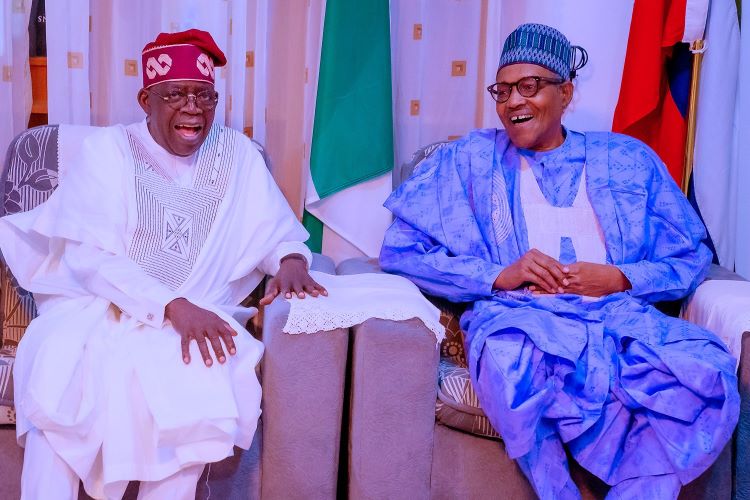Buhari – Tinubu: Two Inseparable Realities
Posted on April 13, 2025
ABDULLAHI O. HARUNA HARUSPICE

Former President Muhammadu Buhari is not just an enigma; he is a mystery that has defied the normal parameters of political comprehension. He is the kind of phenomenon that philosophers refer to as the noumenon—the reality that exists beyond sensory perception, unknowable yet powerfully felt. Cloaked in silence, his mystique grows in absence. He does not announce his presence; he allows it to be discovered—often too late, or never completely.
It’s been two years since Buhari vacated the seat of power, and yet his influence—contrary to political logic—has not diminished. Rather, like a magnetic element activated by distance, he has grown more attractive, more revered, more commanding. His Daura home became a sanctuary for political pilgrims until recently, when he relocated to his Kaduna residence. But instead of the stream of visitors waning, it has turned into a flood. Heads of serving and former government functionaries now troop to Kaduna with urgency, their visits shrouded in the familiar opacity that defines Buhari’s entire political journey.
But what are they looking for?
The question itself suggests the answer. They are not looking for Buhari the man—they are searching for Buhari the myth. In a country where silence is often more potent than speech, Buhari’s post-presidential reclusion is not a retreat—it is a statement. And the statement is this: power, in Nigeria, does not die. It only migrates. And sometimes, it hides in plain sight.
President Bola Ahmed Tinubu, the quintessential political strategist, is the visible heir of Nigeria’s contemporary power architecture. His long walk from kingmaker to king was not accidental—it was designed. Calculated. Earned through decades of network-building, coalition-brokering, and mastery of political machinery. He is the antithesis of Buhari in temperament but not in trajectory. Where Buhari was aloof, Tinubu is engaged. Where Buhari preferred stillness, Tinubu dances on the chessboard. But scratch the surface, and the lines begin to blur.
Both men are bound by a common destiny—an overlapping shadow that neither has tried to escape. Buhari’s administration ended, but his aura did not. Tinubu’s began with a roaring mandate, but it carries echoes of the past that cannot be ignored. In the corridors of power, whispers persist that the past president still holds sway—not in decrees or directives, but in influence, in symbolic legitimacy, in the simple act of being Buhari.
When ministers, governors, and party chieftains make their way to Kaduna, it is not just nostalgia that drives them. It is calculation. It is political instinct. It is the eternal quest for alignment with the unseen hand. Tinubu may sit at the helm, but even he knows that power in Nigeria is not a straight line. It is a circle of rituals, loyalties, debts, and shadows.
And therein lies the paradox: Buhari’s silence speaks, while Tinubu’s actions echo. One operates from the margins, the other from the center—but both form the nucleus of Nigeria’s evolving political metaphysics.
The truth is, Buhari and Tinubu are no longer just individuals. They are dual realities—inseparable, co-dependent, each shaping the other’s meaning. To understand Tinubu’s reign is to understand Buhari’s withdrawal. To decode Buhari’s quietude is to grasp the complexity of Tinubu’s assertiveness. One is the unmoved mover, the other the dynamic executor. But both remain forces—different in form, united in function.
This is why the Kaduna pilgrimage will continue. Because in Nigerian politics, clarity rarely comes from official channels. It comes from signs, from symbols, from the spaces between what is said and what is done. And Buhari, the silent philosopher-king, remains Nigeria’s most potent symbol of power deferred but not diminished.
In the end, one thing is certain: President Muhammadu Buhari will not jump ship. He will align and sustain the aspirations of President Bola Ahmed Tinubu, no matter the stormy realities ahead. Buhari is Tinubu, because Buhari is consistent in character and conviction. The day he lifted Tinubu’s hand and handed him the All Progressives Congress (APC) presidential flag at the primaries was the day he submitted intoto his support for Asiwaju. That gesture was not just symbolic—it was spiritual, strategic, and deeply loyal. And loyalty, for Buhari, is not a costume. It is core.
Realistically musing
Categorised as : Opinion
No Comments »










